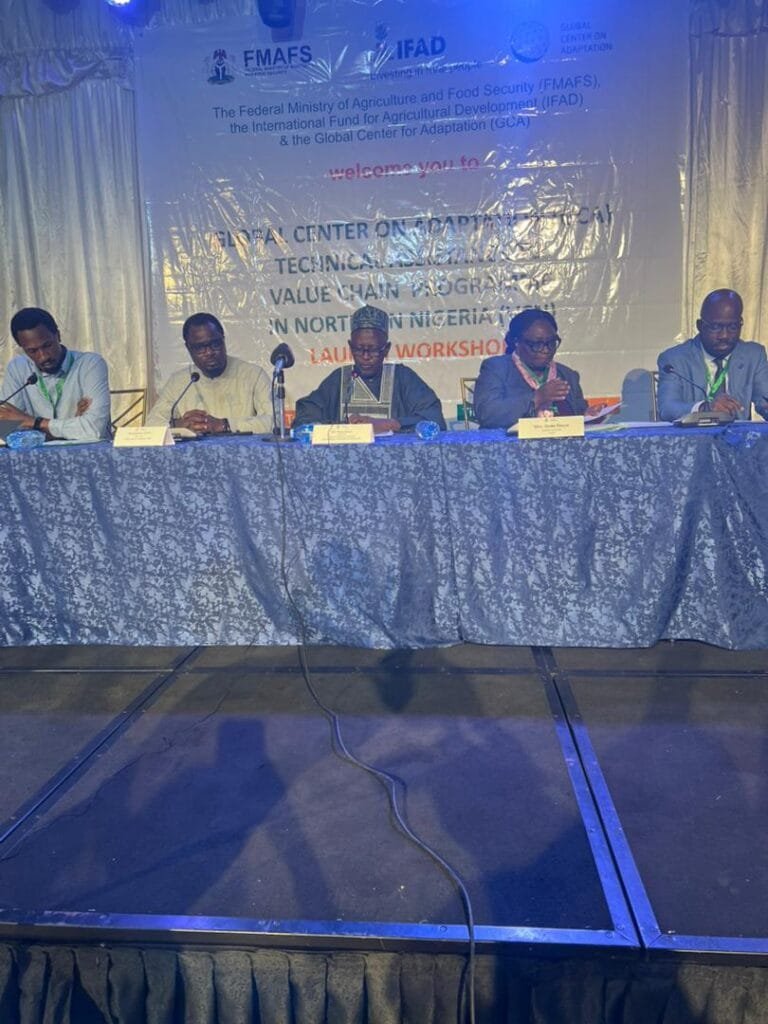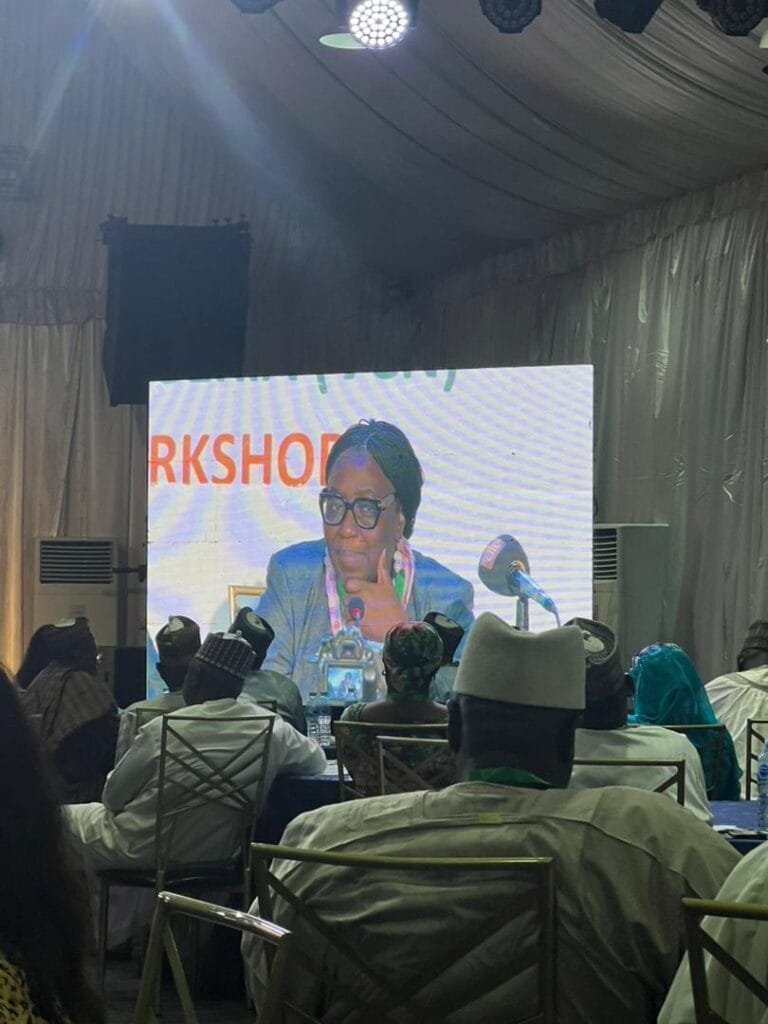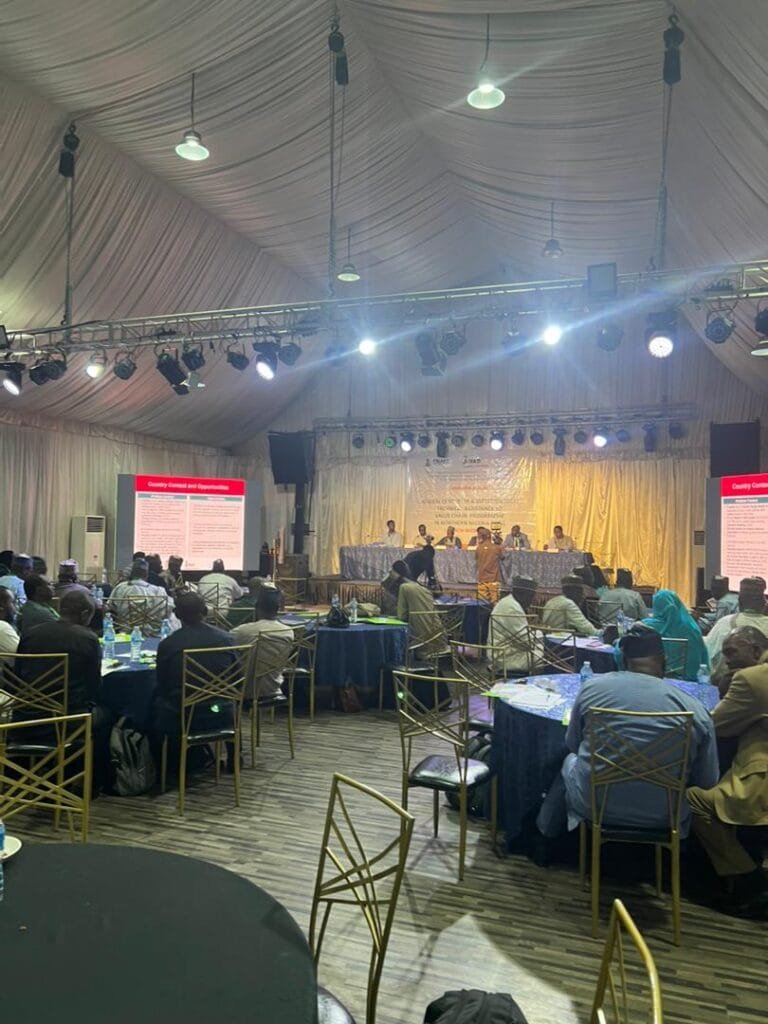The Federal Government in collaboration with the International Fund for Agricultural Development (IFAD) has partnered the Global Center for Adaptation (GCA) on Climate Resilience and Adaptation to offer technical assistance to the Value Chain Programme in Northern Nigeria (VCN).
VCN is a strategic initiative aimed at improving the livelihoods of smallholder farmers by strengthening value chains, enhancing agricultural productivity, and increasing access to markets. In line with the Presidential Emergency Declaration on Nigeria’s Food Security, the National Agricultural Technology and Innovation Policy (NATIP), the Food System Transformation Pathways and the 8-point Renewed Hope Agenda, the programme aims to contribute to poverty reduction, enhance nutrition and resilience of rural populations in nine (9) northern states of Nigeria.
Financed by the Federal Government of Nigeria, International Fund for Agricultural Development (IFAD) and Agence Française de Développement (AFD), VCN program also aligns with a) United Nations Sustainable Development Cooperation Framework (UNSDCF 2023-2027), b) IFAD Nigeria Country Strategic Opportunities Programme (COSOP 2024-2029) and c) AFD Nigeria Country Intervention Strategy.
Speaking at the Launch Workshop of GCA Technical Assistance to the Value Chain Programme in Northern Nigeria (VCN), on Tuesday in Abuja, the Minister of Agriculture and Food Security, Senator Abubakar Kyari, in his Keynote Address, said the pivotal collaboration holds immense promise for Nigeria’s Agricultural future.
According to him, the technical assistance by GCA adds vital value to the VCN programme and will help to accelerate its implementation in line with the Joint Roadmap for Accelerated Startup signed on May 7th by the Government of Nigeria and IFAD during a High-Level event chaired by the Vice-President.

His words, “This ambitious initiative, by Global Center on Adaptation (GCA) greatly underscores our collective commitment to addressing the pressing challenges posed by climate change. As many of you are aware, the northern states of Nigeria play a crucial role in our nation’s agricultural landscape, particularly in both food and cash crops agricultural production. However, they also face significant vulnerabilities due to climate variability and extreme weather events.
“The Value Chain Program in Northern Nigeria will represent a strategic response to these challenges. By focusing on enhancing climate resilience throughout the agricultural value chain, from production to market access, we aim to ensure sustainable food and nutrition security for our people. This initiative will not only strengthen the resilience of smallholder farmers but also promote inclusive economic growth and rural development.
“This partnership with GCA serves as a testament to our shared commitment to innovation and partnership in pursuit of a climate-resilient future. Together, we will leverage cutting-edge adaptation solutions, scientific expertise, and best practices to safeguard our agricultural sector against climate impacts and ensure a Food and Nutrition Secure Nigeria. “
Represented by the Director, Projects Coordinating Unit (PCU), FMAFS, Bukar Musa, the Minister said the technical assistance that will be implemented by Genesis Analytics, a global impact firm, will help equip us with; a deeper understanding of climate vulnerabilities across selected key value chains; a robust adaptation strategy to help address climate vulnerability in each selected value chain; a medium-term climate finance mobilization plan to increase investment in climate resilience and accelerated strategy for the implementation of the Digital Innovation Action Plan (DIAP).
On her part, the Country Director, IFAD Nigeria, Dede Ekoue, appreciated the Federal Government of Nigeria , the Federal Ministry of Agriculture and Food Security, the Federal Ministry of finance, the Ministry of Environment, the VCN participating states government, and development agencies as well as the cofinancing AFD for their steadfast commitment and efforts made to design the VCN project in a participating manner and in alignment with national policies and regional priorities to transform the agricultural landscape of Northern Nigeria.
According to her, “the VCN Programme is a bold step by the Federal Government to transform the agrifood systems for food security, inclusive and resilient growth in line with the Renewed Hope Agenda.
“The project aims to sustainably reduce poverty, enhance nutrition and better resilience and income of smallholder farmers and most vulnerable populations in the nine northern states, which include Borno, Bauchi, Kano, Katsina, Kebbi, Jigawa, Sokoto, Yobe and Zamfara.
“This program will leverage existing and new initiatives in the northern region to catalyze transformation success while also connecting with Special Agro-Industrial Processing Zones (SAPZs) for win- win benefits for food security, the farmers, youth and women agroprocessors and agro-industries.
“Through the VCN, the Federal Government is partnering with national and international development partners to FastTrack the nexus humanitarian, peace and development by harnessing the potential of the region for the sustainable achievement of the following priorities a) ensuring food security and nutrition, b) promoting economic development and c) ensuring social resilience including climate resilience and social cohesion among Nigeria’s Northern rural populations.”
Explaining the importance of the Workshop, the Country Director said, “This workshop is not just a launch but a collective space for us to co-create solutions and reaffirm our shared responsibility in addressing the climate challenges through practical and digital solutions that help strengthen food systems and advance rural development in Northern Nigeria.
“The success of this technical assistance and indeed of the broader VCN programme depends on sustained collaboration, local ownership, and adaptive learning. IFAD is committed to ensuring that this process is inclusive, transparent, and anchored in the real needs of the communities we serve.”

Speaking to AgroNigeria on the sidelines, Mr. Oluwabunmi Ajilore, Senior Program Officer, Food Security and Rural Wellbeing, GCA, highlighted the critical role of collaboration in addressing climate challenges and ensuring food security.
“Strong partnerships are essential to maximizing the impact of climate adaptation investments,” Ajilore said. “This programme is not only about protecting farmers, but also about reinforcing Nigeria’s broader food security framework.”
According to him, the initiative is to offer technical support to help stakeholders identify climate risks linked to priority crops of the programme.” Leveraging climate analytics and adaptation tools, the project will pinpoint vulnerabilities and recommend actionable solutions to minimize climate-related disruptions.
“The tools we’re introducing will guide stakeholders in assessing risks, evaluating adaptation options, and crafting effective response strategies,” Ajilore added.

Accordingly, “Given Northern Nigeria’s pivotal role in national food production, the region is a key target for this intervention. With increasingly unpredictable weather patterns and climate pressures, the initiative aims to equip farmers with the resources and knowledge needed to adapt and sustain agricultural productivity.
“Enhancing the region’s food systems directly contributes to national food security. Our goal is to empower farmers, fortify value chains, and foster collective resilience against climate risks,” he asserted.
Furthermore, Ajilore said the workshop marks a strategic move to integrate climate adaptation into agricultural policy and investment planning, supporting Nigeria’s wider development and food security objectives.
Also speaking, a representative of Genesis Analytics, Rotimi Etomi, explained that the technical assistance component of the VCN project is structured into six key phases, spreading across the year.
“This includes the inception phase, climate vulnerability and impact assessment, climate adaptation strategy development, campus development sessions, adaptation financing mobilization, and digitization support.
“We’re currently in the inception phase, which includes this workshop,” Etomi said, noting that the team is working to align with all stakeholders on the project’s objectives and detailed work plan.
“Our aim is to support the integration of climate adaptation and digital tools into selected agricultural value chains while unlocking climate financing to enhance resilience,” he added.
The Programme Officer, IFAD, Nigeria, Dr. Isaac Mensah, explained that the VCN programme is an eight Year-Project (2025-2032), with a total Financing of US$158.1 million including FGN, IFAD, AFD, and States.
He added that IFAD financing for the project is to a tune of US$86.7million with a target to benefit 3,100 000 Household members.
Meanwhile the workshop brought together representatives of the Federal Ministry of Agriculture and Food Security, VCN participating states government, Climate change and environment experts, African Development Bank, World Bank, Food And Agriculture Organization (FAO), World Food Programme, National Council on Climate Change, NiMet , Commissioners of Agriculture and Permanent Secretaries, Islamic Development Bank, among other development partners.


